With a runny nose of any etiology vasoconstrictor and vasodilator nasal drops can be used. Such funds quickly relieve swelling of the mucous membrane and free breathing. There are certain differences between nasal drugs of this type, so it is important to have a complete understanding of their features and rules of use.
Record content:
- 1 Classification
-
2 The best drugs from the pharmacy
-
2.1 For adults
- 2.1.1 Tizine
- 2.1.2 Otrivin
- 2.1.3 Naphtizin
- 2.1.4 Rinofluimucil
- 2.1.5 Sanorin-analergin
-
2.2 For pregnant
- 2.2.1 Snoop
- 2.2.2 Galazolin
-
2.3 For children
- 2.3.1 Nazivin
- 2.3.2 Vibrocil
- 2.3.3 Nazol
-
2.1 For adults
- 3 Video about nose drops
Classification
For the treatment of rhinitis, topical preparations are prescribed. Some of these drugs are vasodilator drops. Their purpose is to restore full circulation in the small blood vessels of the nasal cavity. The quality of nasal breathing depends on the state of the mucous membrane and the thickness of the capillaries.
It should be noted that vasoconstrictor and vasodilator drugs are agents of the same principle of action.
Nasal drops relieve soft tissue swelling that occurs both with narrowing and with expansion of the vascular network. Any change in the state of the vessels of the nasal cavity prevents full access of air and deterioration of the drainage of mucus in the nasopharynx.
Vascular dilation and, as a result, mucosal edema do not occur on their own.
The main causes of a runny nose and nasal congestion are:
- allergic reactions;
- infection with a pathogen from the rhinovirus group;
- bacterial and fungal infections;
- period of hormonal changes;
- the impact of other factors from the outside.
Vasodilator nasal drops are not the only dosage form for the treatment of rhinitis. Adults can use sprays to relieve nasal congestion and relieve breathing, while children are generally advised to use drops using a pipette.
Conditionally, the compositions of vasoconstrictor and vasodilating drops can be divided according to the active substance in their composition.
Most modern drugs use components such as:
- oxymetazoline;
- xylometazoline;
- phenylephrine;
- naphazoline.
These substances and their derivatives differ in the duration of action and the severity of side effects. In addition to the active ingredients, nasal drops may differ.In addition, not all preparations based on these compounds can be used to treat children, pregnant and lactating women.
Often, treatment with vasodilators is combined with other drugs. For example, with rhinitis of allergic etiology, you have to use antihistamines in parallel. In case of severe inflammation, together with vasodilators, the doctor may prescribe corticosteroid, antibacterial or antiviral compounds to the patient.
The best drugs from the pharmacy
Among the vasodilators, there are drugs that have long earned the trust of specialists and therefore are in demand among the population. These medicines are sold in any pharmacy and are dispensed without a prescription.
Self-selection and use of vasodilating nasal drops is not the most correct and safe solution. Only a doctor can choose the most effective drug that matches the indications and age.
For adults
Vasodilator nasal drops are prescribed by specialists only in case of severe edema and shortness of breath. It is important to understand that prolonged and uncontrolled use of such funds can cause drug addiction or side effects. Nasal drops must be used strictly according to the instructions or medical prescription.
Tizine
The main active ingredient is xylometazoline, which stimulates the vegetative processes of vasoconstriction and expansion of blood vessels.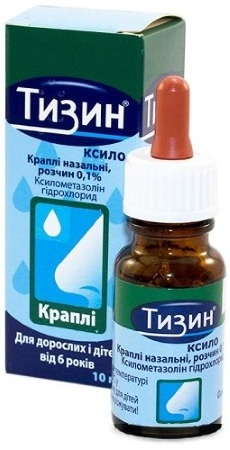
Auxiliary components in the composition of drops are:
- benzalkonium chloride;
- sodium chloride;
- sorbitol;
- sodium dihydrogen phosphate dihydrate;
- disodium edetate;
- purified water.
This drug is produced in 10 ml vials with a dosing pipette and a screw cap.
The principle of action of Tizin, like other nasal adrenergic agonists, can reduce swelling and hyperemia of the mucous membrane, facilitate the discharge of liquid secretions from the nose. The therapeutic effect occurs 2 minutes after instillation.
Indications for the use of a vasodilator are respiratory diseases accompanied by rhinitis, otitis media and allergic reactions. Tizine in a standard dosage (0.1% xylometazoline) is prescribed for adults 3 times a day. For children, drops with 0.05% active substance content are suitable, which are usually dripped 2-3 times during the day.
Like any drugs that affect the state of the capillaries of the nasal cavity, Tizin is not recommended for use for more than 1 week.
The main side effect of the drug is irritation, dryness in the nose. With the uncontrolled use of Tizin drops, there is a high risk of developing drug-induced rhinitis, a syndrome in which thickening and atrophy of the mucous membrane occurs. Doctors call this the "rebound" effect. Airway obstruction can occur as a result of swelling.
Contraindications to the use of Tizin are individual intolerance to its components and the simultaneous administration of drugs that increase blood pressure indicators. For glaucoma and severe atherosclerosis, nasal drops from the group of vasodilators are not used.
The drug is sold over the counter without a prescription. The approximate cost of 1 bottle is 110 rubles.
Otrivin
This drug is a direct analogue of Tizin, since it has the same form of release, the same active substance and principle of action. Otrivin practically does not differ in the set of auxiliary compounds. In pharmacies, nasal drops are sold in 10 ml vials.
One of the advantages of Otrivin is the property of the xylometazoline contained in it to reduce the production of mucus and promote its constant drainage, which relieves the patient's condition with congestion breathing.
As a rule, there are few negative reviews about these vasodilator drops due to their easy tolerance and balanced pH level. In addition, the preparation contains menthol and eucalyptol, which have a cooling effect on the inflamed nasal mucosa.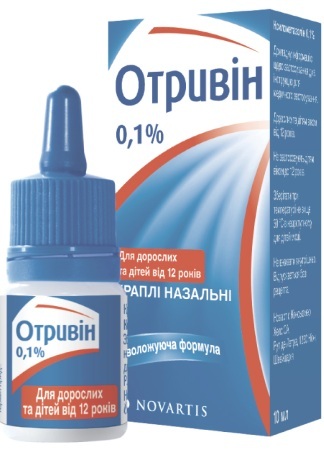
Otrivin can be used not only for colds, but also for allergic diseases, sinusitis, eustachitis and otitis media. The drug is prescribed to patients before routine ENT diagnostics.
The drug is administered intranasally: adults and adolescents need to drip the medicine into the nose, 2 drops in each nostril, no more than 3 times a day.
Side effects are extremely rare and are often a manifestation of the body's hypersensitivity to the constituent components.
Overdose or prolonged use of vasodilating nasal drops may be impaired sleep and wakefulness, headache, nausea, a feeling of excessive dryness in the nose and nasopharynx.
Contraindications for use, in addition to allergies, are hyperthyroidism, heart problems, the postoperative period after neurosurgical manipulations. Otrivin is not prescribed for children under 12 years of age, for pregnant women, lactating women and is used with extreme caution in diabetes mellitus, prostatic hyperplasia, cardiac arrhythmias.
Otrivin nasal drops are dispensed in an over-the-counter form and do not require special conditions for storing the bottle (at t ° no more than +25 ° C). The price of the drug is about 200 rubles.
Naphtizin
Vasoconstrictor drops have an indisputable advantage - minimal cost. A bottle of Naphtizin costs patients no more than 20-25 rubles. Nasal drops produce a quick effect and retain their effect for 3-4 hours after instillation.
Naphthyzine is recommended for various conditions:
- acute and chronic rhinitis;
- hay fever;
- allergic laryngeal edema.
By the way, Naphtizin at a dosage of 0.05% can be used intraconjunctivally. The active component naphazoline, which is present in the composition of the drug, helps to relieve irritation of the eye mucosa. This can be done only in the absence of contraindications and consultation with a doctor.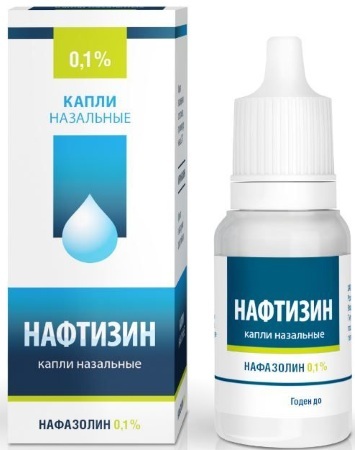
Do not drip naphthyzine into children under 1 year old and patients with diabetes mellitus. It is not recommended to use the drug simultaneously with antidepressants from the group of MAO inhibitors.
As for the use of the drug during the period of gestation, exceptions are possible here: with strict indications and the absence of restrictions, the use of Naphthyzin in a minimum dosage is allowed.
With prolonged use of drops with naphazoline, the severity of the vasodilating and vasoconstrictor action achieved through them decreases.
It should also be borne in mind that this drug blocks the absorption of local anesthetics, lengthening the wave of their effect during superficial anesthesia. The maximum duration of the course of using Naphtizin, according to the manufacturer's recommendations, is 1 week.
Rinofluimucil
A distinctive feature of this drug is the presence in its composition of not only vasodilating components, but also a substance that dilutes thick nasal secretions - acetylcysteine. Rinofluimucil produces a mucolytic and vasodilating effect and is used exclusively in otolaryngological practice.
Due to the content of tuaminoheptane sulfate, the drug quickly narrows and then dilates the vessels, stopping the swelling and hyperemia of the nasal mucosa. After removing the edema, acetylcysteine can easily eliminate the viscosity of mucous and purulent-mucous secretions, and accelerate the healing process.
These nasal drops are used to treat sinus inflammation, acute, chronic and vasomotor rhinitis.
The vasodilator is produced in the form of a spray, therefore the bottle is equipped with a special aerosol-type nebulizer.
For a simpler and more effective application, the nozzle can be changed to a dropping pipette and Rinofluimucil can be used at the following dosage:
| Age | Single dose | Frequency of application per day |
| Adults and adolescents over 12 years of age | 1-2 drops | 3-4 times |
| Children from 6 to 12 years old | 1 drop | 3 times |
| Children under 6 years of age | 1 drop | 2 times |
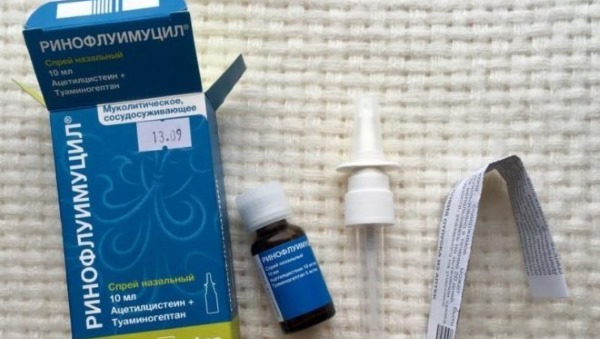
The duration of therapy with this drug should not exceed the standard course of treatment with vasodilators. To avoid side effects (most often Rinofluimucil causes palpitations, tachycardia, increased blood pressure, agitation, dryness of the mucous membrane, allergies), it is important to strictly follow the recommended dosage.
For children under 3 years of age, the drug is not prescribed, and for women during pregnancy or lactation, drops can be used in the absence of alternative treatment options. Special storage conditions for these nasal drops are not required. The medicine is dispensed without a prescription and costs about 300 rubles.
Sanorin-analergin
The main vasodilating components here are antazoline and naphazoline. The drug is manufactured by a Czech pharmaceutical company. Most often, Sanorin-analergin is prescribed to patients prone to allergic rhinitis, since the drops, in addition to adrenomimetics, contain H1-histamine receptor blockers.
The drug is a clear liquid poured into dark glass vials with a rubber pipette.
The active ingredients of Sanorin-anallergin help to eliminate puffiness and reduce mucus production, therefore, after instillation, nasal breathing is instantly facilitated.
If you use these drops for 6-8 days in a row, the development of tolerance to the drug is possible - this means that with constant use, the antiallergic properties of the drops are reduced. The effect after instillation lasts for 3-6 hours.
Vasodilator sprays and nasal drops are contraindicated in chronic atrophic rhinitis and severe atherosclerosis. It is undesirable to combine Sanorin-analergin with inhalation anesthetics, hypertensive sympathomimetic drugs. It should be noted that the specified nasal drug should not be used in children under 16 years of age.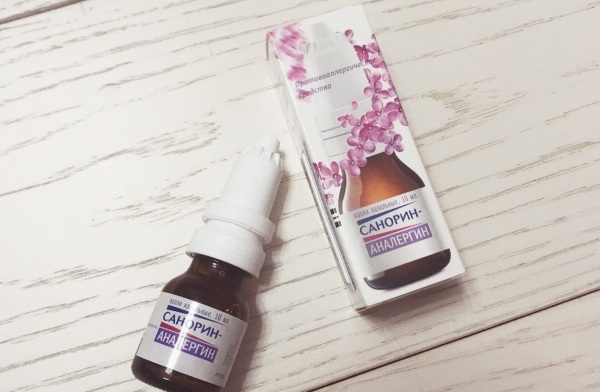
The optimal dosage regimen of the drug is the following scheme: 2-3 drops in each nasal passage 3-4 times a day for 1 week. If necessary, it is allowed to resume the use of the product, but only after a break (7-10 days).
Little is known about adverse reactions. In isolated cases, Sanorin-analergin causes nausea, drowsiness and irritation in the nasal cavity in patients. An overdose of naphazoline can also manifest itself with similar symptoms.
It is impossible to combine breastfeeding and taking this drug, therefore, if there is an urgent need to use a vasodilator composition, lactation should be interrupted for the period of treatment. Pregnancy is an absolute contraindication for the use of Sanorin-anallergin.
The price for 1 bottle of nasal drops averages 280-320 rubles. The drug is dispensed in conventional pharmacies without a prescription.
For pregnant
Nasal congestion, swelling, and a causeless runny nose during pregnancy are common.
But, as you know, the vast majority of medicines passing through the maternal bloodstream enter the blood of the fetus, therefore, to the choice of medicines, who could help a woman in solving this problem and at the same time not harm her unborn child, it is necessary to approach with a special caution.
Vasodilators and vasoconstrictors should only be used in extreme cases with the permission and supervision of a physician. Most often, pregnant women are prescribed Snoop and Galazolin.
Snoop
The drug is an adrenergic agonist for local use in ENT practice. This tool is available in bottles with a spray dispenser. The active vasodilator component in the composition is xylometazoline, but the main feature is the use of marine water, which manages to stabilize the state of the ciliated epithelium and stabilize the production process mucus.
Also, in comparison with analogues, the drug has an important advantage - minimal absorption, therefore even state-of-the-art laboratory equipment allows detecting xylometazoline concentrations in a patient serum.
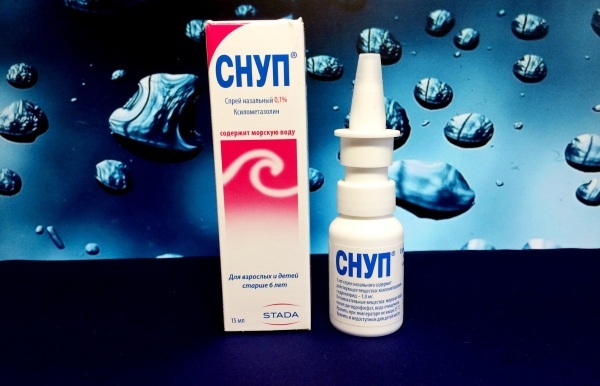
The indications for the use of Snoop are the following diseases:
- allergic rhinitis;
- seasonal hay fever;
- chronic sinusitis;
- eustachitis and otitis media;
- preparation for research procedures.
The vasodilator spray cannot be used in patients with the same limitations as described above. In addition, before use, you should definitely consult a doctor for patients suffering from diabetes mellitus, severe cardiovascular pathologies, prostate adenoma. Children under 2 years old cannot use Snoop.
To facilitate breathing and relieve nasal congestion, the recommended dosage for pregnant women can be called 1-2 injections of a solution with a 0.05% concentration of xylometazoline. On average, the treatment course should be no more than 5-7 days.
Judging by user reviews, there is practically no exact information about the side effects. Negative symptoms can occur against the background of an overdose and an increase in the frequency of exposure to the active components of Snoop on the mucous membranes of the nasal cavity.
Vasodilator nasal drops, including Snoop, have an affordable price (from 114 to 137 rubles) and are sold everywhere. No prescription is required for the purchase of the medication.
Galazolin
A vasodilator based on xylometazoline has several forms of release. In addition to the usual nasal drops, Galazolin is found in the form of a gel and a spray, as well as a spray dosed with menthol and eucalyptus.
The product can be used by adults and children under 4 months of age. In the absence of contraindications, Galazolin is allowed to be used by pregnant women, observing the "child" dosage: 0.05% nasal solution, 1-2 drops, no more than 2-3 times a day.
The drug is effective for normalizing the patency of the Eustachian tube, relieving edema in the nasal passages, openings of the maxillary and other sinus sinuses.
The instructions for use indicate such indications for use as:
- acute rhinitis of any etiology;
- sinusitis;
- eustachitis and otitis media.
With prolonged use of Galazolin nasal drops (more than 10-14 days), the risk of developing secondary vasoconstriction and the development of drug-induced vasomotor rhinitis increases.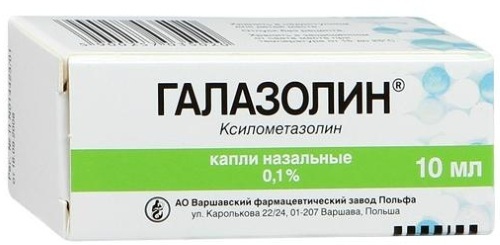
The manufacturer warns of possible adverse reactions in the form of dryness and irritation of the nasal mucosa, burning, sneezing, temporary nasal congestion. There is no confirmed information about cases of overdose.
Among the contraindications to the use of Galazolin, it is worth noting:
- atrophic form of chronic rhinitis;
- glaucoma;
- hyperthyroidism;
- diabetes;
- high blood pressure;
- heart rhythm disturbances;
- hormone-dependent adrenal tumors.
The shelf life of Galazolin is 4 years from the date of issue indicated on the outside of the package. Store nasal drops at a temperature not exceeding 25 ° C in a place far from sunlight and out of the reach of children. The cost of 1 bottle of Galazolin does not exceed 50 rubles.
For children
Vasodilator nasal drops are prescribed for children with acute respiratory diseases and allergies. If simple rinsing with saline is not enough, nasal medications of this category may be used as directed by a physician.
Moreover, sprays in childhood, as a rule, are not used due to an anatomically incomplete process the formation of the nasal passages: aerosol particles can enter the inner ear and provoke an inflammatory process.
Nazivin
The main vasodilator component here is oxymetazoline. Nazivin is available in different concentrations (0.001, 0.025 and 0.05%) and volumes (5 and 10 ml). The product is sold in bottles of 5 and 10 ml.
Oxymetazoline belongs to the group of anticognestants, which are used for various pathologies of the respiratory organs. Like other vasodilating drops, Nazivin does not eliminate the cause of the disease, but only relieves the symptoms. The drug does not produce a systemic effect on the body.
For children from the first days of life to 12 months. use Nazivin baby, containing a minimum concentration of oxymetazoline, 1 drop in each nostril 2-3 times a day. Nasal drops with a dosage of 0.025% are suitable for children from 1 year to 6 years, and 0.05% - from 6 to 12 years.
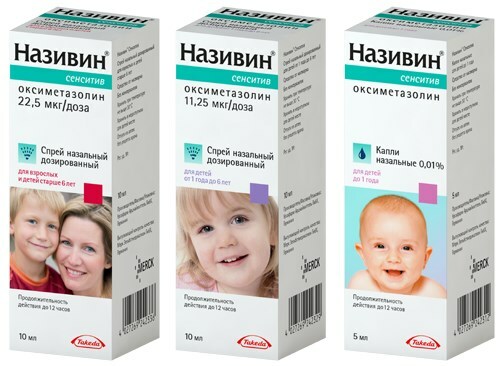
Like any other drug that affects small blood vessels, Nazivin is not prescribed for atrophic rhinitis, glaucoma, allergies, diabetes mellitus. By the way, nasal drops, if necessary, can be used by pregnant and lactating women.
In case of an overdose with Nazivin, it is possible to change the heart rate, the appearance of nausea, headache, feelings of anxiety. If a child accidentally took the medicine by mouth, he urgently needs to rinse the stomach and give a sorbent.
Drops are dispensed in pharmacies without a prescription, the price of the drug depends on the volume of the bottle, the dosage of oxymetazoline and is in the range of 150-220 rubles.
Vibrocil
The drug is based on phenylephrine, a synthetic type of adrenergic agonists. As a rule, Vibrocil is easily tolerated by children, does not cause side effects, and has a wide range of indications for use. In addition to phenylephrine, it is worth noting dimethindene in the composition of the drug - an antiallergic substance, an antagonist of histamine receptors.
The list of contraindications for these nasal drops is the same as for previous drugs. Vibrocil can be used in children over 1 year old with a runny nose of an allergic, viral or bacterial origin.
In the annotation to the drug, the optimal dosage is indicated: 3-4 times a day, 1-2 drops for children under 6 years old, 3-4 drops for children over 6 years old and adults. The drug is sold in a pharmacy without a prescription, it costs about 280 rubles.
Nazol
This is another phenylephrine-based vasodilator. It first narrows the capillaries, eliminates puffiness, then promotes vasodilation, reducing puffiness and secretion of nasal discharge. Nazol Baby is allowed for children under the age of 1 year.
According to the instructions, intranasal drops should be used as follows:
- children under 1 year old - 1 drop every 6 hours for 3-5 days;
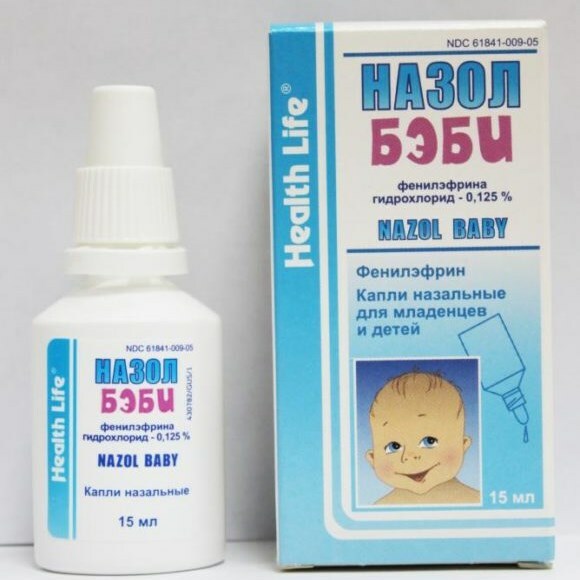
- from 1 year to 6 years - 1-2 drops with the same frequency and duration;
- for the rest, a single dose is 3-4 drops.
Calpi are available in 15 ml and 30 ml vials. Side effects are extremely rare and are manifested by burning or dryness of the mucous membranes of the nose and nasopharynx. In case of an overdose against the background of prolonged use of drops (more than 7 days), patients experience redness of the nasal mucosa, palpitations, nausea, and sleep disturbances.
Nazol is approved for use as an over-the-counter drug. The cost of a medicine in Russian pharmacies is approximately 235 - 291 rubles.
In the treatment of rhinitis, vasodilators are prescribed for both adults and children. Nasal drops should be picked up by a specialist, despite the fact that most of these medicines are sold over the counter without a prescription.
Video about nose drops
Comparison and review of nasal drops:



